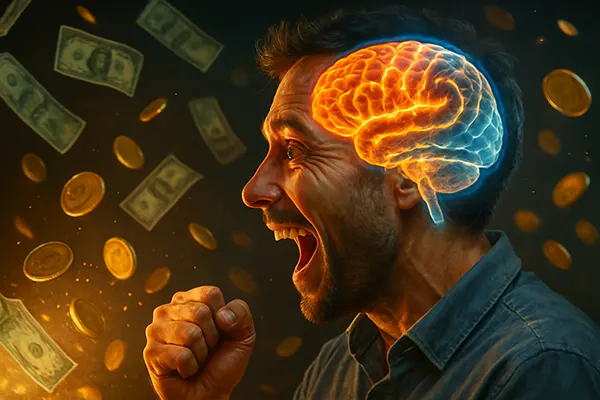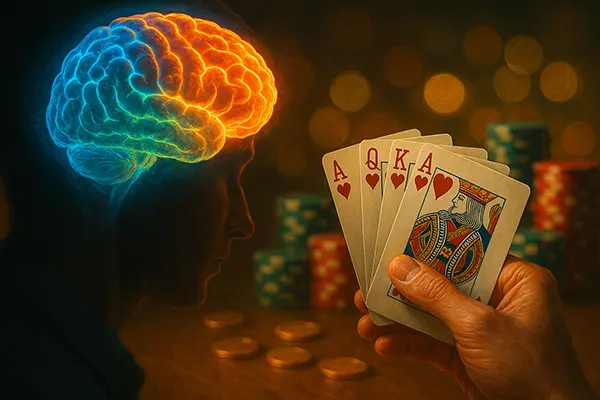
Psychology of Winning: What Happens in the Brain After a Big Win
Winning large sums of money, particularly in gambling scenarios, can trigger intense psychological and neurological responses. While the joy of success seems self-explanatory, the brain’s actual reaction involves a cascade of hormonal, emotional, and behavioural changes. Exploring the psychology of a big win through a scientific lens reveals not just temporary euphoria but also patterns that may influence future decision-making and risk tolerance.
The Neurochemical Rush of Victory
When someone experiences a significant win, the brain responds by releasing high levels of dopamine, a neurotransmitter strongly associated with pleasure, reward, and reinforcement learning. This surge occurs predominantly in the mesolimbic pathway, including the nucleus accumbens, which is a central player in the brain’s reward system. The result is a euphoric high not unlike what is observed in substance use disorders.
This dopamine release not only reinforces the sensation of pleasure but also contributes to the formation of memory pathways linking the act of gambling to the rewarding feeling. This mechanism makes the experience memorable and potentially addictive, especially if the win was unexpected or particularly large.
Moreover, neuroimaging studies conducted in 2024 by neuroscientists at King’s College London confirm that a large monetary reward lights up the same brain regions as romantic love or music-induced chills. It underscores how deeply wired the human brain is to respond to unexpected rewards, regardless of their source.
Why Risk Becomes More Appealing After a Win
One of the most studied phenomena in behavioural economics is the “house money effect” — the tendency of individuals to take greater risks after a financial gain. This isn’t merely a rational decision-making error; it is rooted in real neurological and hormonal changes. Elevated dopamine and adrenaline levels post-win can distort the brain’s evaluation of risk and reward.
As stress hormones decrease and pleasure chemicals increase, players often feel invincible or overly optimistic. They become more willing to bet again, even in objectively unfavourable situations. This overconfidence is compounded by cognitive distortions, such as the illusion of control or the gambler’s fallacy, which suggest that winning streaks will continue or that skill has more influence than luck.
Psychologists like Dr Emma Harvey, specialising in behavioural addiction, warn that these chemical shifts are what make gambling one of the most subtly addictive behaviours. It’s not just the win — it’s how the brain learns to crave the internal high it produces.
The Post-Win Syndrome: Emotional and Behavioural Fallout
Once the euphoria of a win wears off, many individuals experience a paradoxical emotional crash, often referred to as “post-win depression” or “post-reward letdown.” This state is characterised by irritability, restlessness, or a strong urge to replicate the previous experience. The emotional void left after a dopamine high can be profound, particularly when the win led to unrealistic expectations or social validation.
Some individuals may begin to chase that high, not necessarily to win more money, but to regain the internal pleasure it produced. This pattern of behaviour aligns closely with what clinicians identify as behavioural addiction. According to a 2025 study from the University of Cambridge, 62% of self-reported high-stakes gamblers admitted to feeling “psychologically worse off” one week after a major win.
The consequences can extend beyond mood swings. Relationships, financial planning, and even job performance may suffer as individuals shift focus from real-life responsibilities to replicating a highly stimulating experience that has now become a reference point for pleasure and achievement.
Case Studies and Psychological Insight
One widely discussed case in the psychological community is that of a 38-year-old man in Manchester who won over £100,000 on a slot game and subsequently spiralled into compulsive gambling. His case, published in the British Journal of Psychology, illustrates how a single win can shift a previously casual player into obsessive behavioural loops.
Therapists working with such individuals often employ Cognitive Behavioural Therapy (CBT) to help patients dissect the win and separate the emotional high from the factual reality. By reframing the experience, patients learn to neutralise the triggers that could lead to repeated risk-taking behaviour.
Dr Clara Jenkins, a clinical psychologist specialising in gambling disorders, states that “The psychological impact of a win is underestimated. It is not the money that leads people back, but the psychological footprint it leaves.” Her insights reflect a growing recognition of the win as a potential trauma rather than simply a positive event.

Can Awareness Help Break the Cycle?
Recognising the psychological patterns following a win is critical in building personal resilience and fostering responsible gambling behaviours. Awareness itself doesn’t prevent addiction, but it provides a foundation upon which healthier habits can be built. Understanding the role of neurotransmitters, cognitive distortions, and post-win emotional shifts gives players tools to reflect on their experiences more objectively.
Several awareness campaigns in the UK, such as “Win Smart”, launched in early 2025, aim to educate players about the chemical consequences of winning. These initiatives include short animations, testimonial videos, and counselling resources designed to make the science of gambling more accessible to the general public.
Furthermore, digital tools like self-exclusion programs and dopamine tracking apps are being increasingly recommended by clinicians to disrupt the cycle of emotional dependency. These interventions encourage users to reflect on their motivations and better manage post-win urges before they lead to harm.
Strategies for Maintaining Balance
While not all wins lead to harmful patterns, recognising early signs of psychological dependency is essential. Experts recommend setting pre-defined win/loss limits, taking regular breaks, and engaging in non-gambling activities to recalibrate one’s sense of reward. These simple tactics help to reduce reliance on the dopamine highs associated with gambling.
Support systems also play a vital role. Sharing one’s experiences with friends, family, or professional support networks can help normalise the psychological turbulence that may follow a big win. These conversations provide an outlet and reduce the shame or confusion that often prevents individuals from seeking help.
Ultimately, the psychology of winning is about far more than money. It is a complex interplay of chemistry, emotion, and cognition. Those who understand it are better positioned to enjoy occasional success without being psychologically captured by it.
